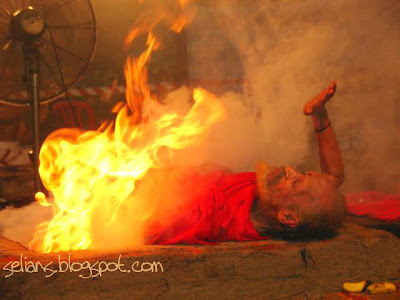Postal voting secrecy compromised: polls watchdog
Athi Veeranggan Mar 6, 08 7:35pm (source: http://www.malaysiakini.com/news/79292)
During his observation, Mafrel northern region coordinator BK Ong discovered that all the army and police personnel were required to fill up a separate identity declaration form consisting of their name, identity card number and ballot paper' serial number prior to voting.
Although voting was carried out privately, each voter was compelled to enclose together both his ballot paper and identity declaration form inside the postal vote envelope before putting it into the ballot bag.
Upon checking the postal vote envelope, the identity declaration form will clearly reveal the identity of the voter and who he had voted for.
"Voting secrecy is among the most fundamental principles of the democratic process. It should not be compromised," Ong said.
Mafrel discovered this ‘tainted’ electoral process when observing postal voting at the Bukit Gedung army base in Bayan Lepas and Northeast District police headquarters in Georgetown.
For the first time, the Election Commission has accredited Mafrel as the country's 12th general election watch observers.
The commission allowed only 333 Mafrel volunteers as official election observers in polling stations this year. The accreditation seems to have paid off as Mafrel's four-man team led by Ong made this discovery.
"We do not know whether EC, the police or army officials are behind the introduction of the identity declaration form. But the most important issue is voting and voter's secrecy has been compromised. This is an election offence," he asserted.
EC's lack of enforcement of the election laws has compromised the confidentiality of one's vote and made a mockery of the country's democratic process, said Ong.
Fears confirmed
Under provisions stipulated in Section 5 Part II of the Election Offences Act 1954, one is prohibited from obtaining or revealing the identity of voters and their votes, such as names, identity card numbers and ballot paper serial numbers.
"If convicted for such an offence, one faces a maximum one-year jail or a fine of up to RM3,000, or both.
Suspicion has often been cast on the postal voting process conducted for army and police personnel.
The country has 220,000 postal votes.
Mafrel’s revelation today seems to confirm fears that postal votes have been manipulated and the secrecy of voters compromised.
"The identity declaration form instills fear on the army and police personnel who want to vote freely without fear or favour," said Ong.
Another serious flaw noted in the election process for army and police personnel is that the voting was managed and conducted by police and army officers themselves.
Although EC officials and appointed agents shall handle the voting process, Ong expressed shock that this did not happen in the army and police bases.
"EC officials and agents were nowhere around," he claimed.
seals: this is more serious then the "ink" matter
During his observation, Mafrel northern region coordinator BK Ong discovered that all the army and police personnel were required to fill up a separate identity declaration form consisting of their name, identity card number and ballot paper' serial number prior to voting.
Although voting was carried out privately, each voter was compelled to enclose together both his ballot paper and identity declaration form inside the postal vote envelope before putting it into the ballot bag.
Upon checking the postal vote envelope, the identity declaration form will clearly reveal the identity of the voter and who he had voted for.
"Voting secrecy is among the most fundamental principles of the democratic process. It should not be compromised," Ong said.
Mafrel discovered this ‘tainted’ electoral process when observing postal voting at the Bukit Gedung army base in Bayan Lepas and Northeast District police headquarters in Georgetown.
For the first time, the Election Commission has accredited Mafrel as the country's 12th general election watch observers.
The commission allowed only 333 Mafrel volunteers as official election observers in polling stations this year. The accreditation seems to have paid off as Mafrel's four-man team led by Ong made this discovery.
"We do not know whether EC, the police or army officials are behind the introduction of the identity declaration form. But the most important issue is voting and voter's secrecy has been compromised. This is an election offence," he asserted.
EC's lack of enforcement of the election laws has compromised the confidentiality of one's vote and made a mockery of the country's democratic process, said Ong.
Fears confirmed
Under provisions stipulated in Section 5 Part II of the Election Offences Act 1954, one is prohibited from obtaining or revealing the identity of voters and their votes, such as names, identity card numbers and ballot paper serial numbers.
"If convicted for such an offence, one faces a maximum one-year jail or a fine of up to RM3,000, or both.
Suspicion has often been cast on the postal voting process conducted for army and police personnel.
The country has 220,000 postal votes.
Mafrel’s revelation today seems to confirm fears that postal votes have been manipulated and the secrecy of voters compromised.
"The identity declaration form instills fear on the army and police personnel who want to vote freely without fear or favour," said Ong.
Another serious flaw noted in the election process for army and police personnel is that the voting was managed and conducted by police and army officers themselves.
Although EC officials and appointed agents shall handle the voting process, Ong expressed shock that this did not happen in the army and police bases.
"EC officials and agents were nowhere around," he claimed.
seals: this is more serious then the "ink" matter


Comments